Breastfeeding Promotion Switzerland
Breastfeeding Promotion Switzerland is an independent, national centre of competence for all groups of professionals and organisations who work in the area of pregnancy, child birth and with small children, and also an information platform for parents.It was established in 2000 as a non-profit organisation. The goal is to coordinate and improve the availability of independent information related to the benefits of breastfeeding to the public. Support comes from governement, cantons, public health organisations and institutions.
Contents
- Infant feeding in situations of acute crisis
- Information material on breastfeeding
- Back to work while breastfeeding
- Breastfeeding on the go
- World Breastfeeding Week
- Codex Panel
- Corona-Virus COVID-19
Leaflet breastfeeding guide
to orderWith imagery and little text in easy language, the most important information about breastfeeding is compiled on 4 pages:
- Breastfeeding positions
- Breast massage and milk expression
- Correct latching on
- Breastfeeding frequency and security
The leaflet is available in the following languages:
- English
- German
- French
- Italian
- Albanian
- Arabic
- Bosnian/Croatian/Serbian
- Portuguese
- Spanish
- Tamil
- Tigrinese
- Turkish
- Ukrainian
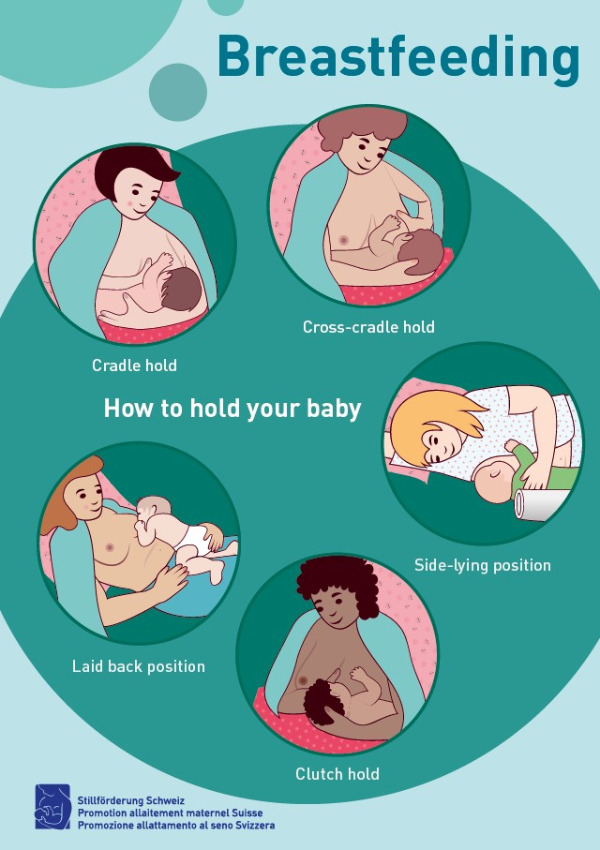
Poster breastfeeding guide
to orderWith imagery and little text in easy language, the most important information about breastfeeding is compiled on an A2 poster:
- Breastfeeding positions
- Breast massage and milk expression
- Correct latching on
- Breastfeeding frequency and security
The poster is available in the following languages:
- German
- French
- Italian
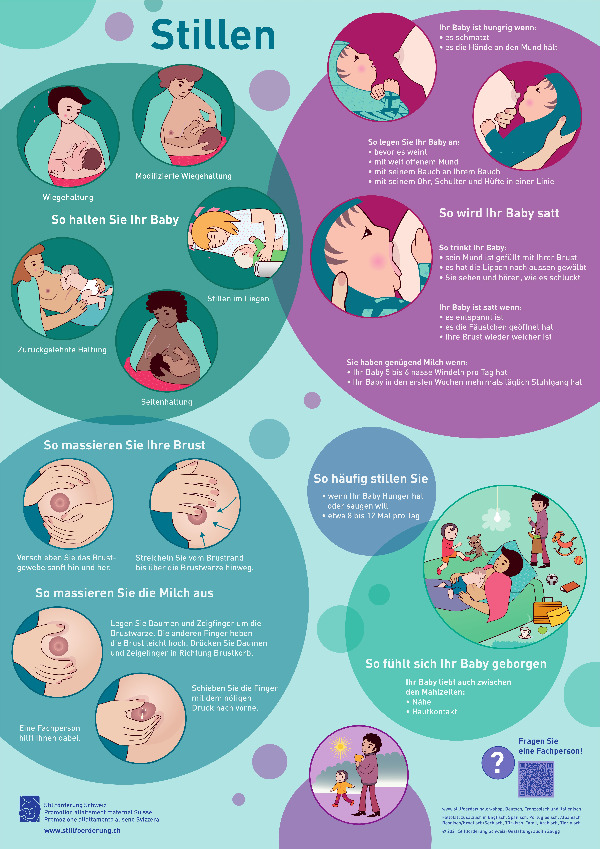
Breastfeeding brochure
The booklet "Breastfeeding - a healthy start to life" answers the most important questions about breastfeeding.
- breastfeeding preparation in pregnancy
- breastfeeding in the first hours and days after birth
- recommendations for breastfeeding frequency and duration of breastfeeding
- breastfeeding positions
- breastfeeding and back to work
- difficulties
- contact addresses for expert advice
Available in the following languages:
- English
- German
- French
- Italian
- Albanien
- Arabic
- Portugese
- Bosnian/Croatian/Serbian
- Spanish
- Tamil
- Turkish
- Tigrinya
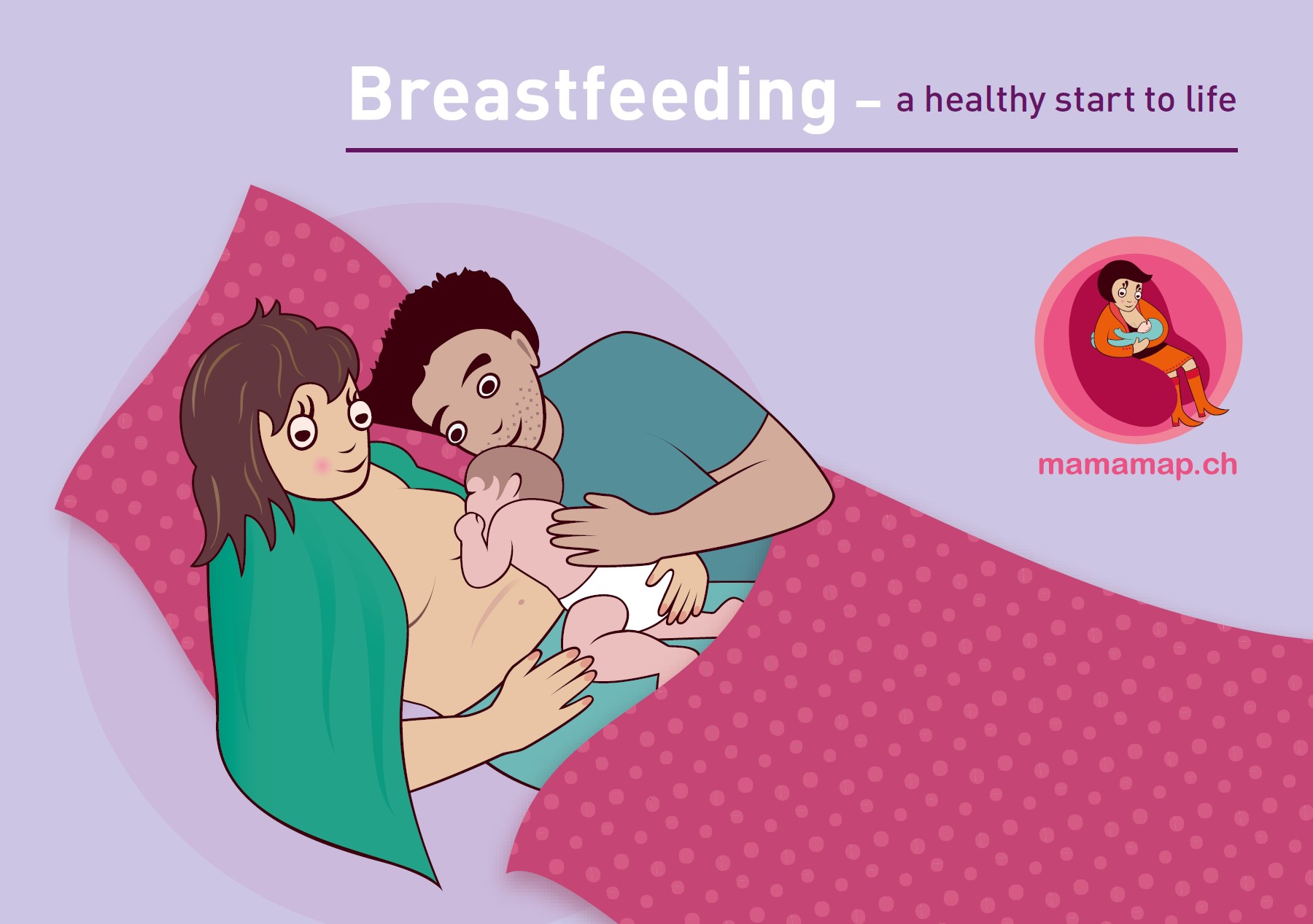
Especially for fathers
As a father, you want the best for your baby
Fathers today have a demanding task. They want to take responsibility for the family, be present in it and carry out their role as a father competently and lovingly. This is a great challenge, and sometimes it may feel overwhelming. Don't stress yourself out with guilt when you reach your limits. You can be sure: you are not the only one feeling this way! In this area of tension, you need to shape your role as a father so it suits you.
Choose your own path – invest in your relationship with your baby
Give your child nature's most precious food: breast milk
Breast milk is the best food to give your baby a healthy and strong start in life. Studies show: as a father, you have a big influence on whether and for how long your partner breastfeeds. Use it!
Breast milk is healthy.
-
It is tailored to your baby's needs.
Breastfeeding strengthens your child physically and emotionally.
Breastfed babies are sick less often.
Read the entire text here
Download PDF here
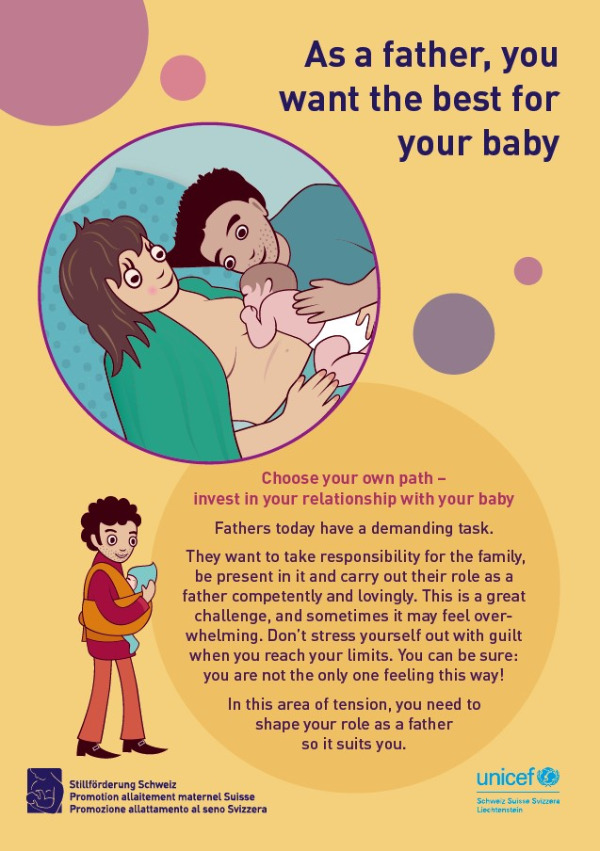
"Breast is best"
An award winning training film on breastfeeding, breast milk, and the first contact with the newborn. (duration 45 min.)Correct latching-on, breastfeeding positions, skin-to-skin contact after birth, breastfeeding after cesarean, health benefits for mother and child, sore nipples, jammed milk ducts, mastitis, sleepy babies, increasing milk production, breastfeeding at night, breastfeeding of preterm infants, pumping and expressing by hand, breastfeeding twins and infants and the function and role of specialists are some of the many topics of the film.
Breast is best was written and directed by Dr. med. Gro Nylander, gynecologist and obstetrician and national coordinator of the BFHI initiative in Norway.
The film is available in Englisch, German, French (Youtube or Vimeo) and Italian (Youtube oder Vimeo).
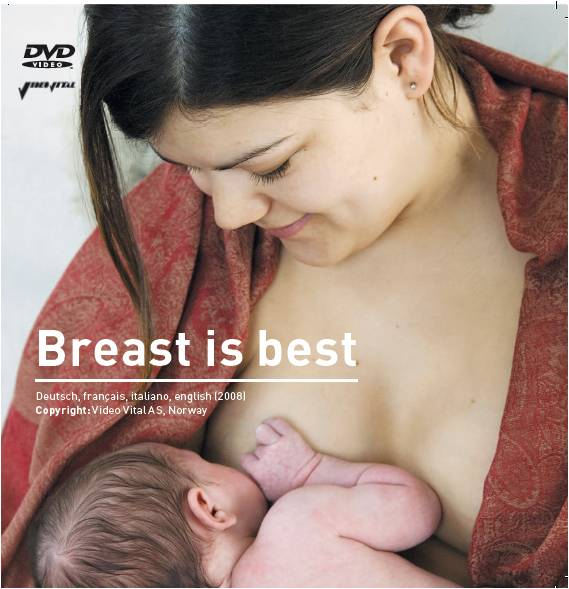
The short version of the film "Breast is best"
Key sequences from the award-winning instructional film on breastfeeding "Breast is best" were selected by the scientific advisory council of Breast Feeding Promotion Switzerland.Content: Information on benefits of breastfeeding for mother and child, bonding, correct positioning, breastfeeding positions and duration of breastfeeding.
- English Youtube oder Vimeo
- German
Youtube
or
Vimeo
- French
Youtube
or
Vimeo
- Italian Youtube or Vimeo
- Spanish
Youtube
or
Vimeo
- Albanian Youtube or Vimeo
- Arabic Youtube or Vimeo
- Farsi Youtube or Vimeo
- Kurdish Youtube or Vimeo
- Portugese Youtube oder Vimeo
- Somali Youtube or Vimeo
- Tamil Youtube or Vimeo
- Tigrinya Youtube oder Vimeo
- Turkish Youtube o Vimeo
Flyers with the information on the link to the film can be ordered.
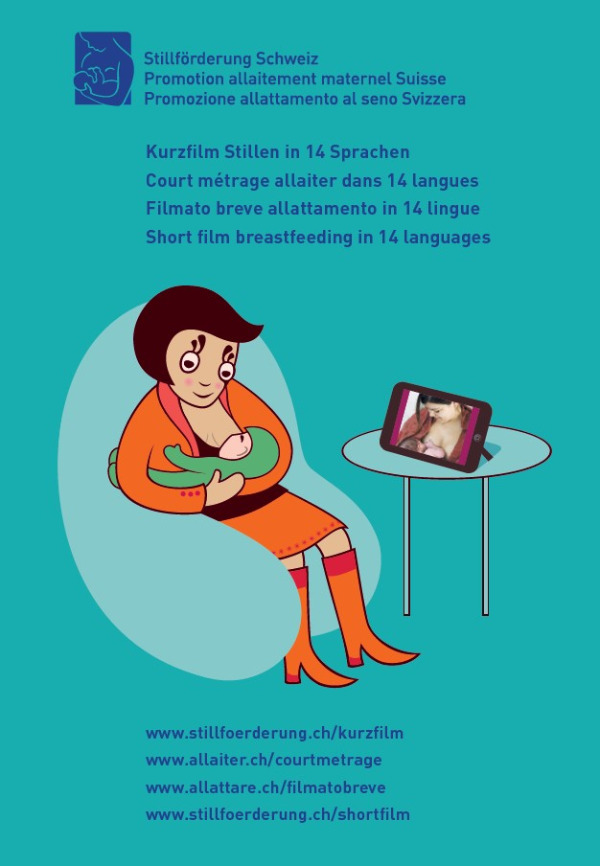
Breastfeeding the premature infant – film for informing the parents
A baby born premature is always a special situation. Breast milk and a lot of skin-to-skin-contact with the parents are very important in the beginning. With the right support to the mother, a premature baby can learn to breastfeed. It pays to keep trying. Breast milk is tailored to the needs of the baby. It is the best-tolerated food and supplies abundant immune substances.- Breastfeeding the premature infant
- Stillen von Frühgeborenen
- L'allaitement des prématurés Youtube oder Vimeo
- L'allattamento dei neonati prematuri
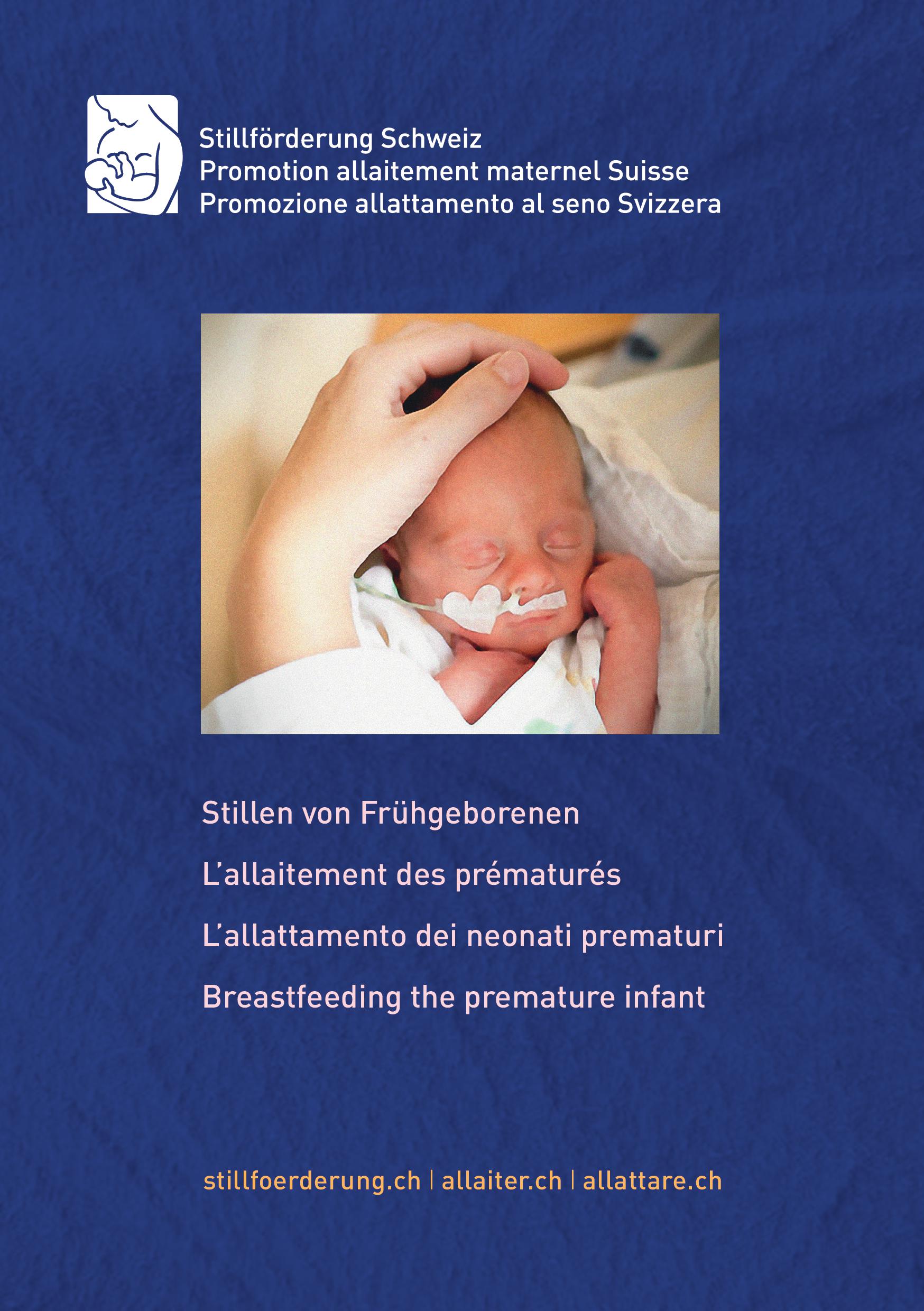
Global Health Videos
Films on various breastfeeding topics are available from Global Health in the following languages:Expressing Colostrum – during pregnancy and after the Birth
Already in the middle of pregnancy (from about the 16th week of pregnancy), the first mother’s milk (colostrum) is synthesized in the mother’s breast. In many cases, particularly in women with gestational diabetes as well as diabetes mellitus types I and II, it can be advisable to express small amounts of this valuable substance towards the end of the pregnancy (from the 37th week) in order to store it as a contingency reserve for the initial period after the birth. For other women, it is interesting to become familiar with breast massage and hand expression during the pregnancy, so that they can quickly make available the valu-able colostrum if necessary after the birth.
In any case, personal instruction by a trained professional is needed for expressing colostrum. This handout should serve only as reminder for you.
PDF Handout Englisch: Expressing colostrum - during pregnancy and after the birth
Storing breast milk
PDF Storing breast milkCleanliness is important:
- Wash your hands.
- Use a clean jar or cup with a lid.
- Or use a breast milk bag.
- After pumping, wash all parts of the pump with hot water and detergent.
- Or in the dishwasher.
This is how long you can store expressed breast milk:
- at room temperature (16–29 °C): 3–4 hours
- in the refrigerator (colder than 4 °C): 3 days
- in the freezer (colder than minus 17 °C): 6 months
Here‘s how to thaw breast milk:
- Put the frozen milk in the refrigerator for a few hours.
- Warm the milk in a warm water bath. Shake up the milk. This distributes the fat.
- Do not warm breast milk in the microwave.
- Do not refreeze thawed breast milk.
- Use thawed breast milk within 24 hours. Store it in the refrigerator.
- Your baby didn‘t drink all the breast milk? Throw away the rest.
Pacifiers - a guide
- In the first few days, your baby will learn to suck on your breast. Therefore, do not give them a pacifier.
- If you want to give a pacifier, wait until breastfeeding is going well.
- Try to soothe your baby in other ways:
- Talk and sing to your baby.
- Carry your baby.
- Place your baby on your bare torso.
- Pet, massage, or bathe your baby.
Sometimes your baby will want to suck on yourbreast when they are not hungry. This is normal.
If you give your baby a pacifier, follow this rule: As little as possible, as much as necessary.
Do not force the pacifier on your baby. If the pacifier falls out, do not put it back in the mouth.
After the 1st birthday, give the pacifier to your child only rarely.
This will help your child learn to talk better.
Back to work
Continue to breastfeed when resuming work? The following documentation supply you and your employer with information:- Back to work - guide for the nursing mother
-
Checklist for breastfeeding room in workplaces
- Breastfeeding at work - facts for the employer
- Rights as a breastfeeding mother
Breastfeeding on the go
Finding breastfeeding friendly public places is very easy with the app mamamap.Download for free at the App Store, Google Play or mamamap.ch.
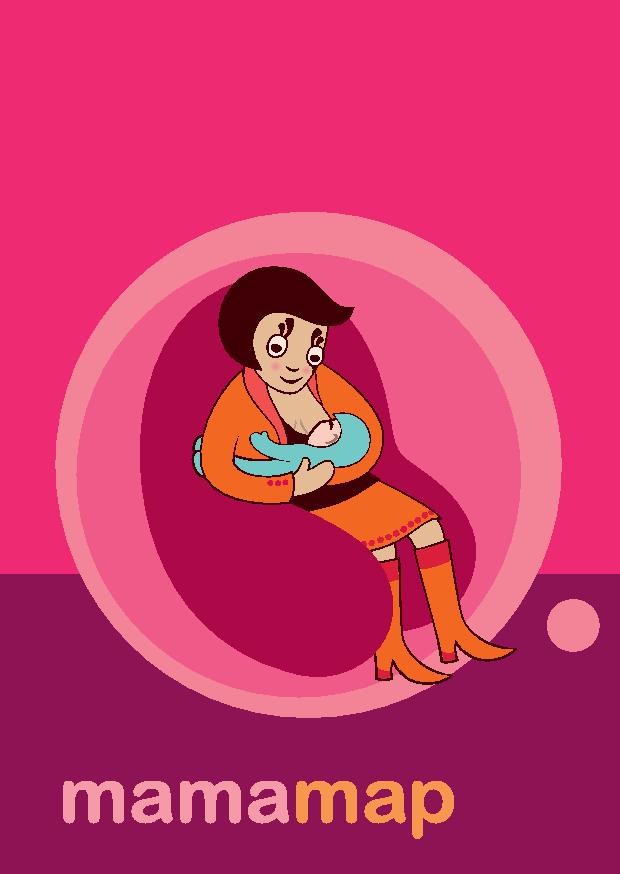
World Breastfeeding Week
Together with different professional associations, the Breastfeeding Promotion Switzerland is involved in the organization and promotion of the International World Breastfeeding Week in Switzerland. For more information click for information in German, French, Italian.WABA
Codex Panel
Breastfeeding Promotion Switzerland is part of the Codex Panel. The Codex Panel is a joint assembly of representatives from manufacturers of infant formula and the stakeholder group for protection of breastfeeding. This panel is responsible for monitoring manufacturers’ compliance with the Swiss codex regarding the marketing of infant formula.Sun protection for breastfeeding mothers – a guide
Components of sunscreens can pass into your breast milk. This guide is about how you can still protect yourself from the sun.PDF Guide sun protection for breastfeeding mothers
The following order applies to sun protection:
1. Shade
- First, avoid the sun.
- Especially the midday sun.
- Beware of indirect radiation, by sun rays reflecting off water or snow.
- UV radiation passes through even when there are clouds. Your skin needs protection from the sun.
2. Clothing
- If sun avoidance is not possible, cover as much as possible of your body with clothing.
3. Sunscreen
- Sunscreens should be used only when shade or covering yourself with clothing is not possible. Preferably use mineral sunscreens.
- The uncovered parts of your body should be covered with sunscreen.
- A high protection factor against UV rays is always better for your skin.
- Mineral sunscreen filters should be used when breastfeeding.
- Get advice at the pharmacy.
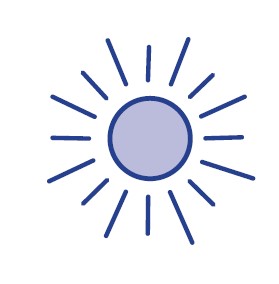
Infant feeding in situations of acute crisis
Infants and young children are particularly vulnerable in situations of crisis and at risk of malnutrition. This can lead to very rapid donation and distribution of infant formula, bottles and teats.
In acute emergency situations, breast milk is the best and safest source of nutrition for the infant. Supplemental feeding of formula reduces the supply of breast milk. In case the formula cannot be distributed regularly and hygienic conditions are inadequate, infants are exposed to additional risks.
Stress can affect the milk-giving reflex, but frequent feeding can stimulate it.
It is important to provide enough food and fluids for nursing mothers as well.
For the above reasons, it is important to note that formula donations should
- be given on demand.
- not be given with the general food distribution.
- be distributed with explanations, information and education to the staff of aid organizations, if possible.
- be distributed together with clean water.
In times of crisis, mothers with infants need special protection and support so they can breastfeed their children.
PDF - Infant feeding in situations of acute crisis
Corona-Virus COVID-19
If vou didn’t get a vaccination before or during your pregnancy, we recommend you get vaccinated with an mRNA vaccine immediately after giving birth and while breastfeeding. There is unlikely to be a risk to the breastfed infant if its mother is vaccinated.
On the contrary: there are indications that mothers who have been vaccinated give the infant a certain degree of protection from COVID-19 through their milk.
Covid-19 vaccination during pregnancy
It is now possible for all pregnant women to be vaccinated.
The requirements of medical information, risk-benefit assessment and written consent apply.
Based on extended study data, the FOPH, EKIF and SGGG have decided to make COVID-19 vaccination available to all pregnant women. (28.5.2021)
For COVID-19 vaccination, a written informed consent from the pregnant woman and a prescription (by specialist gynecologist/obstetrician or general practitioner) must be available. The pregnant woman can then register directly online in the cantonal vaccination registration websites to receive an appointment for vaccination. (Immunization prioritization is determined by cantonal health departments).
To date, well over 200,000 pregnant women in the U.S. have been vaccinated against COVID-19 with the mRNA vaccines, with no evidence of unexpected side effects on mother or child.
At the end of April 2021, a prospective non-randomized follow-up registry study of over 35,000 vaccinated pregnant women was published (Shimabukuro et al., N Engl J Med, April 22, 2021), showing no evidence of direct or indirect adverse effects of vaccination with respect to pregnancy, embryonic/fetal development, childbirth, or postnatal development.
Covid-19 vaccination and breastfeeding
Can the mother be vaccinated after birth and during breastfeeding?
According to current knowledge, it is possible to be vaccinated immediately after birth. A risk to the breastfed infant is unlikely due to the mother's vaccination. (Source: Federal Office of Public Health FOPH; Jan. 25, 2021)
Further information: A joint recommendation of the German Society for Perinatal Medizine. V. (DGPM), the German Society of Gynecology and Obstetrics e. V. (DGGG) in collaboration with the National Breastfeeding Commission (NSK).
I am infected with the new corona virus. Can I breastfeed my child?
You can breastfeed your child. It is important that you follow the recommended hygiene and behavioral rules, which your midwife or doctor will explain to you after the birth. In doing so, you will protect your newborn from infection. (Source: Federal Office of Public Health FOPH).
Further information:
Swiss Society of Gynecology and Obstetrics
Professional Association of Swiss Lactation Consultants
Swiss Association of Midwives
WHO





